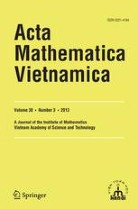
Acta Mathematica Vietnamica
- Volume 50
- Volume 49
- Volume 48
- Volume 47
- Volume 46
- Volume 45
- Volume 44
- Volume 43
- Volume 42
- Volume 41
- Volume 40
- Volume 39
- Volume 38
- Volume 37
- Volume 36
- Volume 35
- Volume 34
- Volume 33
- Volume 32
- Volume 31
- Volume 30
- Volume 29
- Volume 28
- Volume 27
- Volume 26
- Volume 25
- Volume 24
- Volume 23
- Volume 22
- Volume 21
- Volume 20
- Volume 19
- Volume 18
- Volume 17
- Volume 16
- Volume 15
- Volume 14
- Volume 13
- Volume 12
- Volume 11
- Volume 10
- Volume 9
- Volume 8
- Volume 7
- Volume 6
- Volume 5
- Volume 4
- Volume 3
- Volume 2
- Volume 1
Hölder-Type Global Error Bounds for Non-degenerate Polynomial Systems
Si Tiep Dinh
,
Huy Vui Ha
,
Tien Son Pham
Abstract
Let $F := (f_1, \dots, f_p ): \mathbb R^n tp \mathbb R^p$ be a polynomial map, and suppose that $S := \{x \in \mathbb R^n : f_i(x) \geq 0,i = 1, \dots, p\}\not = \emptyset$. Let $d := \max_{i =1, \dots, p} \deg f_i$ and $\mathcal {H}(d, n, p) := d(6d - 3)^{n + p - 1}.$ Under the assumptions that the map $F : \mathbb R^n \to \mathbb R^p$ is convenient and non-degenerate at infinity, we show that there exists a constant $c > 0$ such that the following so-called Hölder-type global error bound result holds $c d(x,S) \le [f(x)]_{+}^{\frac {2}{\mathcal {H}(2d, n, p)}} + [f(x)]_{+} \quad \textrm { for all } \quad x \in \mathbb {R}^{n},$ where $d(x,S)$ denotes the Euclidean distance between $x$ and $S$, $f(x) := \max_{i=1, \dots, p} f_i(x)$, and $[f(x)]_+ := \max\{f(x),0\}$. The class of polynomial maps (with fixed Newton polyhedra), which are non-degenerate at infinity, is generic in the sense that it is an open and dense semi-algebraic set. Therefore, Hölder-type global error bounds hold for a large class of polynomial maps, which can be recognized relatively easily from their combinatoric data. This follows up the result on a Frank-Wolfe type theorem for non-degenerate polynomial programs in Dinh et al. (Mathematical Programming Series A, 147(16), 519–538, 2014).


